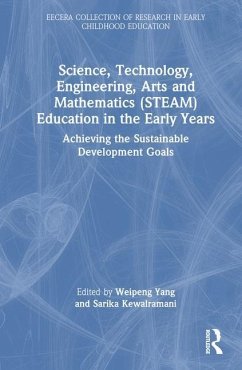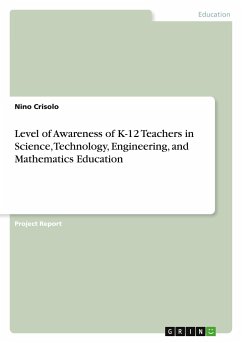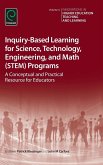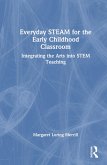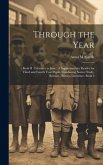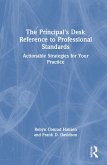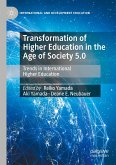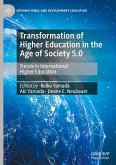Science, Technology, Engineering, Arts, and Mathematics (STEAM) Education in the Early Years
Achieving the Sustainable Development Goals
Herausgeber: Yang, Weipeng; Senthil, Jyoti; Kewalramani, Sarika
Science, Technology, Engineering, Arts, and Mathematics (STEAM) Education in the Early Years
Achieving the Sustainable Development Goals
Herausgeber: Yang, Weipeng; Senthil, Jyoti; Kewalramani, Sarika
- Gebundenes Buch
- Merkliste
- Auf die Merkliste
- Bewerten Bewerten
- Teilen
- Produkt teilen
- Produkterinnerung
- Produkterinnerung
This book provides a fresh perspective on recent debates around integrating STEAM (Science, Technology, Engineering, the Arts and Mathematics) education in early childhood.
Andere Kunden interessierten sich auch für
![Level of Awareness of K-12 Teachers in Science, Technology, Engineering, and Mathematics Education Level of Awareness of K-12 Teachers in Science, Technology, Engineering, and Mathematics Education]() Nino CrisoloLevel of Awareness of K-12 Teachers in Science, Technology, Engineering, and Mathematics Education17,95 €
Nino CrisoloLevel of Awareness of K-12 Teachers in Science, Technology, Engineering, and Mathematics Education17,95 €![Inquiry-Based Learning for Science, Technology, Engineering, and Math (STEM) Programs Inquiry-Based Learning for Science, Technology, Engineering, and Math (STEM) Programs]() Inquiry-Based Learning for Science, Technology, Engineering, and Math (STEM) Programs220,99 €
Inquiry-Based Learning for Science, Technology, Engineering, and Math (STEM) Programs220,99 €![Everyday Steam for the Early Childhood Classroom Everyday Steam for the Early Childhood Classroom]() Margaret Loring MerrillEveryday Steam for the Early Childhood Classroom175,99 €
Margaret Loring MerrillEveryday Steam for the Early Childhood Classroom175,99 €![Through the Year: Book II: February to June: A Supplementary Reader for Third and Fourth Year Pupils, Combining Nature Study, Science, H Through the Year: Book II: February to June: A Supplementary Reader for Third and Fourth Year Pupils, Combining Nature Study, Science, H]() Anna M. ClydeThrough the Year: Book II: February to June: A Supplementary Reader for Third and Fourth Year Pupils, Combining Nature Study, Science, H34,99 €
Anna M. ClydeThrough the Year: Book II: February to June: A Supplementary Reader for Third and Fourth Year Pupils, Combining Nature Study, Science, H34,99 €![The Principal's Desk Reference to Professional Standards The Principal's Desk Reference to Professional Standards]() Robyn Conrad HansenThe Principal's Desk Reference to Professional Standards195,99 €
Robyn Conrad HansenThe Principal's Desk Reference to Professional Standards195,99 €![Transformation of Higher Education in the Age of Society 5.0 Transformation of Higher Education in the Age of Society 5.0]() Transformation of Higher Education in the Age of Society 5.0104,99 €
Transformation of Higher Education in the Age of Society 5.0104,99 €![Transformation of Higher Education in the Age of Society 5.0 Transformation of Higher Education in the Age of Society 5.0]() Transformation of Higher Education in the Age of Society 5.0104,99 €
Transformation of Higher Education in the Age of Society 5.0104,99 €-
-
-
This book provides a fresh perspective on recent debates around integrating STEAM (Science, Technology, Engineering, the Arts and Mathematics) education in early childhood.
Hinweis: Dieser Artikel kann nur an eine deutsche Lieferadresse ausgeliefert werden.
Hinweis: Dieser Artikel kann nur an eine deutsche Lieferadresse ausgeliefert werden.
Produktdetails
- Produktdetails
- Verlag: Routledge
- Seitenzahl: 296
- Erscheinungstermin: 5. Dezember 2023
- Englisch
- Abmessung: 240mm x 161mm x 21mm
- Gewicht: 611g
- ISBN-13: 9781032405698
- ISBN-10: 1032405694
- Artikelnr.: 69032761
- Herstellerkennzeichnung
- Libri GmbH
- Europaallee 1
- 36244 Bad Hersfeld
- gpsr@libri.de
- Verlag: Routledge
- Seitenzahl: 296
- Erscheinungstermin: 5. Dezember 2023
- Englisch
- Abmessung: 240mm x 161mm x 21mm
- Gewicht: 611g
- ISBN-13: 9781032405698
- ISBN-10: 1032405694
- Artikelnr.: 69032761
- Herstellerkennzeichnung
- Libri GmbH
- Europaallee 1
- 36244 Bad Hersfeld
- gpsr@libri.de
Weipeng Yang is an Assistant Professor at the Education University of Hong Kong and Editor for the Journal of Research in Childhood Education. Sarika Kewalramani is a Senior Lecturer in Education at Swinburne University of Technology. Jyoti Senthil is a Doctoral Student pursuing Doctor of Education (EdD) at the University of Bath, United Kingdom.
1. From STEM to STEAM: Creating A More Sustainable and Equitable World for
Young Children Part 1. The Microsystem: How Early Childhood Teachers
Perceive and Practice STEAM - Inequality within and across Countries? 2.
Understanding the Dynamic Process of Integrating and Navigating STEAM in
Australian Early Childhood Education 3. A Chinese Style of STEM Inquiry?
The Discourse of Inquiry-Based STEM Education among Chinese Early Childhood
Practitioners 4. STEAM and Sustainable Development Challenges in Early
Childhood Education: Estonian Preschool Teachers' Views and Practices 5.
Towards the Sustainable Development Goals: STEAM Education Beliefs and
Practices in Turkish Preschools 6. STEAM Education in Preschools in Hanoi,
Vietnam: Teachers' Beliefs About the Learning Environment and Challenges in
Teaching Part 2. The Mesosystem: Higher-Order Effects from New Pedagogies
and Technologies for Promoting Quality and Accessible STEAM Education 7.
Learning STEAM Content Via Arts-Based Hands-On Activities 8. "But Then I Am
the Robot's Brain!": Children's and Preschool Teachers' Communication
During STEM Teaching Scaffolded by Digital Tools 9. Equity and Inclusion
Through STEAM Play in Early Childhood Education: Culturally Valued
Play-Based Practices 10. "Because Every Kid Can Think Like A Scientist":
Reflecting South-African Children's Voices on Being Scientists and
Engineers Based on Their STEAM Experience Part 3. The Exosystem: The Role
of Teacher Education and Policy in Early STEAM Education to Reduce
Inequality 11. Early Childhood Teachers Becoming Makers Themselves Before
Teaching Young Children the Value of Making 12. Saudi Early Childhood
Female Teachers' Perceptions of Children's Gender Stereotypes When
Implementing STEM 13. Early Childhood Teacher Agency and Creative
Insubordination Through STEAM Learning Part 4. The Macrosystem: Achieving
Sustainable Development Goals Through Early STEAM Education to Promote
Social Change 14. The Design of the Curriculum for Sustainability and
Climate Education in the Early Years 15. Children as Inventors of
Sustainable Future: Imagination-Driven Approach to Early STEAM Education
16. STEAM Activities to Advance SDG4 in the Early Years by Making Items
from Recycled Materials 17. "It's Not a Challenge, It's an Opportunity":
Empowering Children to Create a Sustainable Future 18. Challenges and
Opportunities in STEAM Education in the Early Years Against the Global Move
Towards a Sustainable Future
Young Children Part 1. The Microsystem: How Early Childhood Teachers
Perceive and Practice STEAM - Inequality within and across Countries? 2.
Understanding the Dynamic Process of Integrating and Navigating STEAM in
Australian Early Childhood Education 3. A Chinese Style of STEM Inquiry?
The Discourse of Inquiry-Based STEM Education among Chinese Early Childhood
Practitioners 4. STEAM and Sustainable Development Challenges in Early
Childhood Education: Estonian Preschool Teachers' Views and Practices 5.
Towards the Sustainable Development Goals: STEAM Education Beliefs and
Practices in Turkish Preschools 6. STEAM Education in Preschools in Hanoi,
Vietnam: Teachers' Beliefs About the Learning Environment and Challenges in
Teaching Part 2. The Mesosystem: Higher-Order Effects from New Pedagogies
and Technologies for Promoting Quality and Accessible STEAM Education 7.
Learning STEAM Content Via Arts-Based Hands-On Activities 8. "But Then I Am
the Robot's Brain!": Children's and Preschool Teachers' Communication
During STEM Teaching Scaffolded by Digital Tools 9. Equity and Inclusion
Through STEAM Play in Early Childhood Education: Culturally Valued
Play-Based Practices 10. "Because Every Kid Can Think Like A Scientist":
Reflecting South-African Children's Voices on Being Scientists and
Engineers Based on Their STEAM Experience Part 3. The Exosystem: The Role
of Teacher Education and Policy in Early STEAM Education to Reduce
Inequality 11. Early Childhood Teachers Becoming Makers Themselves Before
Teaching Young Children the Value of Making 12. Saudi Early Childhood
Female Teachers' Perceptions of Children's Gender Stereotypes When
Implementing STEM 13. Early Childhood Teacher Agency and Creative
Insubordination Through STEAM Learning Part 4. The Macrosystem: Achieving
Sustainable Development Goals Through Early STEAM Education to Promote
Social Change 14. The Design of the Curriculum for Sustainability and
Climate Education in the Early Years 15. Children as Inventors of
Sustainable Future: Imagination-Driven Approach to Early STEAM Education
16. STEAM Activities to Advance SDG4 in the Early Years by Making Items
from Recycled Materials 17. "It's Not a Challenge, It's an Opportunity":
Empowering Children to Create a Sustainable Future 18. Challenges and
Opportunities in STEAM Education in the Early Years Against the Global Move
Towards a Sustainable Future
1. From STEM to STEAM: Creating A More Sustainable and Equitable World for
Young Children Part 1. The Microsystem: How Early Childhood Teachers
Perceive and Practice STEAM - Inequality within and across Countries? 2.
Understanding the Dynamic Process of Integrating and Navigating STEAM in
Australian Early Childhood Education 3. A Chinese Style of STEM Inquiry?
The Discourse of Inquiry-Based STEM Education among Chinese Early Childhood
Practitioners 4. STEAM and Sustainable Development Challenges in Early
Childhood Education: Estonian Preschool Teachers' Views and Practices 5.
Towards the Sustainable Development Goals: STEAM Education Beliefs and
Practices in Turkish Preschools 6. STEAM Education in Preschools in Hanoi,
Vietnam: Teachers' Beliefs About the Learning Environment and Challenges in
Teaching Part 2. The Mesosystem: Higher-Order Effects from New Pedagogies
and Technologies for Promoting Quality and Accessible STEAM Education 7.
Learning STEAM Content Via Arts-Based Hands-On Activities 8. "But Then I Am
the Robot's Brain!": Children's and Preschool Teachers' Communication
During STEM Teaching Scaffolded by Digital Tools 9. Equity and Inclusion
Through STEAM Play in Early Childhood Education: Culturally Valued
Play-Based Practices 10. "Because Every Kid Can Think Like A Scientist":
Reflecting South-African Children's Voices on Being Scientists and
Engineers Based on Their STEAM Experience Part 3. The Exosystem: The Role
of Teacher Education and Policy in Early STEAM Education to Reduce
Inequality 11. Early Childhood Teachers Becoming Makers Themselves Before
Teaching Young Children the Value of Making 12. Saudi Early Childhood
Female Teachers' Perceptions of Children's Gender Stereotypes When
Implementing STEM 13. Early Childhood Teacher Agency and Creative
Insubordination Through STEAM Learning Part 4. The Macrosystem: Achieving
Sustainable Development Goals Through Early STEAM Education to Promote
Social Change 14. The Design of the Curriculum for Sustainability and
Climate Education in the Early Years 15. Children as Inventors of
Sustainable Future: Imagination-Driven Approach to Early STEAM Education
16. STEAM Activities to Advance SDG4 in the Early Years by Making Items
from Recycled Materials 17. "It's Not a Challenge, It's an Opportunity":
Empowering Children to Create a Sustainable Future 18. Challenges and
Opportunities in STEAM Education in the Early Years Against the Global Move
Towards a Sustainable Future
Young Children Part 1. The Microsystem: How Early Childhood Teachers
Perceive and Practice STEAM - Inequality within and across Countries? 2.
Understanding the Dynamic Process of Integrating and Navigating STEAM in
Australian Early Childhood Education 3. A Chinese Style of STEM Inquiry?
The Discourse of Inquiry-Based STEM Education among Chinese Early Childhood
Practitioners 4. STEAM and Sustainable Development Challenges in Early
Childhood Education: Estonian Preschool Teachers' Views and Practices 5.
Towards the Sustainable Development Goals: STEAM Education Beliefs and
Practices in Turkish Preschools 6. STEAM Education in Preschools in Hanoi,
Vietnam: Teachers' Beliefs About the Learning Environment and Challenges in
Teaching Part 2. The Mesosystem: Higher-Order Effects from New Pedagogies
and Technologies for Promoting Quality and Accessible STEAM Education 7.
Learning STEAM Content Via Arts-Based Hands-On Activities 8. "But Then I Am
the Robot's Brain!": Children's and Preschool Teachers' Communication
During STEM Teaching Scaffolded by Digital Tools 9. Equity and Inclusion
Through STEAM Play in Early Childhood Education: Culturally Valued
Play-Based Practices 10. "Because Every Kid Can Think Like A Scientist":
Reflecting South-African Children's Voices on Being Scientists and
Engineers Based on Their STEAM Experience Part 3. The Exosystem: The Role
of Teacher Education and Policy in Early STEAM Education to Reduce
Inequality 11. Early Childhood Teachers Becoming Makers Themselves Before
Teaching Young Children the Value of Making 12. Saudi Early Childhood
Female Teachers' Perceptions of Children's Gender Stereotypes When
Implementing STEM 13. Early Childhood Teacher Agency and Creative
Insubordination Through STEAM Learning Part 4. The Macrosystem: Achieving
Sustainable Development Goals Through Early STEAM Education to Promote
Social Change 14. The Design of the Curriculum for Sustainability and
Climate Education in the Early Years 15. Children as Inventors of
Sustainable Future: Imagination-Driven Approach to Early STEAM Education
16. STEAM Activities to Advance SDG4 in the Early Years by Making Items
from Recycled Materials 17. "It's Not a Challenge, It's an Opportunity":
Empowering Children to Create a Sustainable Future 18. Challenges and
Opportunities in STEAM Education in the Early Years Against the Global Move
Towards a Sustainable Future

